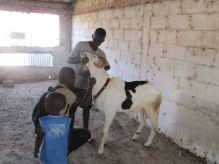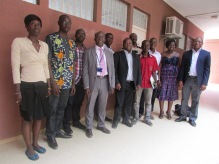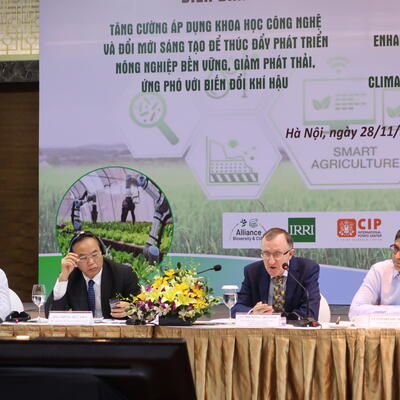
Safe Food, Fair Food team in Côte d’Ivoire and Senegal complete field data collection in small ruminant value chains
Due to the crisis in Mali, the rapid risk assessment on animal health and food safety in the small ruminant value chains which we initially planned to start in March 2013 in Mali, finally started in Senegal in June 2013. Scientists participating in this rapid risk assessment included Professor Bassirou Bonfoh, epidemiologist; Dr Dao Daouda, economist; Dr Gilbert Fokou, anthropologist; Dr Sylvain Traoré, microbiologist; Dr Prisca Ndour, veterinarian; Ms Bernadette Yougbaré and Mr Roland Konan, master students in the project. In each of the eight villages, the village veterinarian took part in this activity. Locally recruited field guides (one per village) and translators (one per village) were also involved.
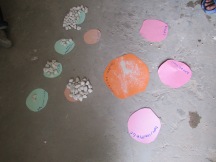
Venn Diagram during a PRA with producers in Dakar (Ngor) showing the proportion of sheep and goats leaving the herd per year (photo credits: Gilbert Fokou/ CSRS).
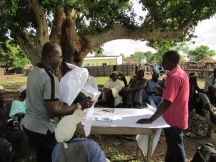
Participatory Rural Appraisal with meat consumers in Tambacounda (Missirah)
(photo credits: Prisca Ndour/EISMV-Dakar)
The study took place in four villages in Tambacounda (Missirah, Gabou, Kothiary and Kouthiaba) and in four villages in Dakar (Ngor, Guediawane, Tivaoune Peulh and Malika). These eight sites were selected in relation to the size of their herds of small ruminants. Other selection criteria were the proximity of Tambacounda to Mali and the high proportion of sheep and goat meat consumption in Dakar. This integrated rapid assessment included a qualitative assessment using participatory appraisals and focus group discussions to better understand knowledge, attitude and practices of preparing and consuming animal-sourced food.
Moreover, small ruminants’ blood samples (n=384) were collected from households in Tambacounda and Dakar and part of the laboratory work, mainly the preparation of serum sample aliquots for further laboratory analysis (ELISA) were carried out in the field. Laboratory analyses starting in November 2013 will aim to diagnose brucellosis, peste des petits ruminants (ovine rinderpest) and other zoonotic diseases of great interest.
Farmers were offered vitamins and dewormers for their animals as compensation for their time to participate in the survey. At the end of the field work, all collected samples were transported and stored in the laboratory of Ecole Inter-Etats des Sciences et Médecines Vétérinaires de Dakar (EISMV). In each of the farms where blood samples were taken, a household questionnaire covering aspects of small ruminants housing types, husbandry practices, human nutrition and general farm management was administrated starting in August 2013.
In August 2013, the two Master students, Bernadette Yougbaré and Roland Konan started their field work in Dakar respectively on: (i) risk management of microbial contamination of meat from small ruminants in slaughterhouses and dibiteries of Dakar, Senegal and (ii) economic risk assessment and options of management performance of slaughterhouses and dibiteries of Dakar, Senegal.
Safe Food, Fair Food is a regional project in sub-Saharan Africa led by the International Livestock Research Institute and funded by BMZ/GIZ. It is promoting food safety in informal markets through risk-based approaches. Field studies are carried out in Ethiopia, Senegal, Tanzania and Uganda. The work in Senegal is coordinated by our partners at Centre Suisse de Recherches Scientifiques in Côte d’Ivoire who contributed this article.





